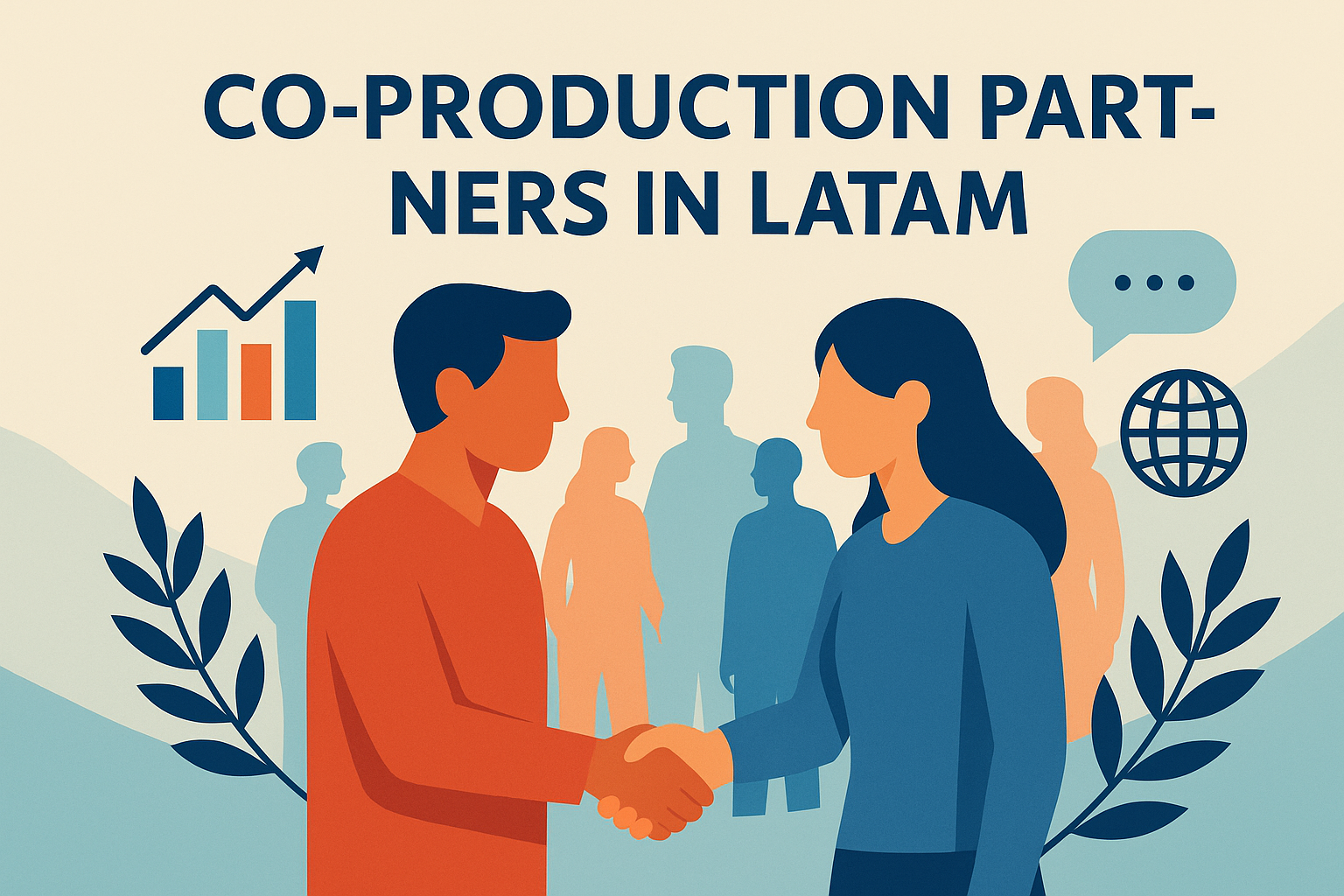Introduction
Are you a filmmaker or producer looking to expand your horizons into Latin America? Discovering the right co-production partners in LATAM can be the key to unlocking new markets, accessing diverse talent, and securing funding opportunities. In this comprehensive guide, we’ll delve into the intricacies of co-production in Latin America, exploring the types of deals available, the benefits and challenges involved, and how platforms like Vitrina can assist you in finding the perfect partners for your projects.
Find the Perfect LATAM Partner!

What is a Production Deal?
A production deal, in the context of film and television, refers to a formal agreement between two or more parties to collaborate on the creation of content. These deals outline the responsibilities, financial contributions, and rights of each party involved in the production process. In Latin America, production deals often involve partnerships between local producers and international entities aiming to tap into the region’s rich cultural narratives and growing markets.
Types of Production Deals in Film & TV
Understanding the various types of production deals is crucial for navigating the co-production landscape in LATAM.
1. Official Co-Productions
These are formal agreements between production companies from different countries, often backed by governmental treaties. Such deals enable producers to access funding, tax incentives, and distribution channels in each participating country. For instance, the Ibermedia program is a notable initiative that supports co-productions among Latin American countries, Spain, and Portugal.
- Service Agreements
In this arrangement, a production company hires another company to provide specific services, such as post-production or location management. While not a co-production in the traditional sense, service agreements are common in LATAM due to the region’s cost-effective production services.
3. Equity Partnerships
Here, multiple production companies invest financially in a project and share profits proportionally. This type of deal is beneficial when pooling resources for high-budget productions.
4. Creative Collaborations
These are informal partnerships where creative input, such as scriptwriting or direction, is shared among parties. While they may not involve financial agreements, they are essential for projects aiming to blend diverse cultural perspectives.
How a Production Deal Works
The process of establishing a production deal typically involves several key steps:
- Project Development: Identifying a compelling story or concept that appeals to multiple markets.
- Partner Identification: Researching and reaching out to potential co-production partners who align with the project’s vision and goals.
- Negotiation: Discussing terms, including financial contributions, creative control, and distribution rights.
- Contractual Agreement: Formalizing the partnership through legal contracts that outline each party’s responsibilities and entitlements.
Production and Distribution: Collaboratively managing the production process and strategizing the distribution of the final product across various markets.
Fast-Track Your Co-Production Success!

Key Players in a Production Deal
Several stakeholders are typically involved in a production deal:
- Producers: Oversee the project’s development, financing, and production logistics.
- Directors and Writers: Provide the creative vision and script for the project.
- Investors: Offer financial backing in exchange for a share of the profits.
- Distributors: Handle the marketing and distribution of the finished product.
Government Agencies: May provide funding, tax incentives, or regulatory support, especially in official co-productions.
Benefits of a Production Deal
Engaging in a production deal, particularly in the LATAM region, offers numerous advantages:
- Access to Funding: Co-productions can unlock financial resources from multiple countries, including grants and subsidies.
- Market Expansion: Collaborating with local partners facilitates entry into new markets and audiences.
- Cultural Diversity: Incorporating diverse perspectives enriches the storytelling and broadens the appeal of the content.
- Resource Sharing: Pooling resources, such as equipment and talent, can lead to cost savings and efficiency.
- Regulatory Advantages: Official co-productions may qualify for national status in each country, easing distribution and exhibition.
Challenges in Securing a Production Deal
While the benefits are substantial, there are challenges to consider:
- Legal Complexities: Navigating different legal systems and regulations can be daunting.
- Cultural Differences: Misunderstandings may arise due to varying work cultures and communication styles.
- Financial Risks: Currency fluctuations and differing economic conditions can impact budgets.
- Creative Disagreements: Aligning creative visions requires compromise and effective communication.
- Logistical Issues: Coordinating across time zones and geographies adds complexity to production schedules.
How Vitrina Helps with Production Deals
Navigating the co-production landscape in LATAM can be streamlined with the assistance of Vitrina. Vitrina is a leading platform that connects filmmakers and producers with a vast network of industry professionals and companies across Latin America.
Key Features:
- Comprehensive Database: Access detailed profiles of over 80,000 production houses, 15,000 production and post services, and 10,000 distributors in LATAM.
- Project Tracker: Stay updated with the Vitrina Global Film+TV Projects Tracker, which monitors projects worldwide, providing insights into development stages and key collaborators.
- Verified Contacts: Connect directly with decision-makers, thanks to Vitrina’s verified contact information and executive profiles.
- Advanced Search Filters: Utilize filters to identify partners based on specialization, location, and past projects.
- Outreach Support: Premium members receive assistance in reaching out and connecting with shortlisted partner companies.
By leveraging Vitrina’s tools and network, filmmakers can efficiently identify and collaborate with suitable co-production partners in LATAM, mitigating challenges and maximizing opportunities.
Conclusion
Embarking on a co-production venture in Latin America presents a wealth of opportunities for filmmakers and producers seeking to diversify their portfolios and reach new audiences. While the process involves navigating complex legal, cultural, and logistical landscapes, the benefits—ranging from financial incentives to enriched storytelling—are substantial. Platforms like Vitrina play a pivotal role in simplifying this journey, offering resources and connections that bridge gaps and foster successful collaborations.
Frequently Asked Questions
Ibermedia is a co-production initiative that supports film and TV projects among Latin American countries, Spain, and Portugal, providing funding and promoting cultural exchange.
Utilizing platforms like Vitrina allows you to access a vast network of verified production companies and professionals across Latin America.
Official co-productions can access funding and incentives from participating countries, enjoy simplified distribution, and gain national status in each country involved





































